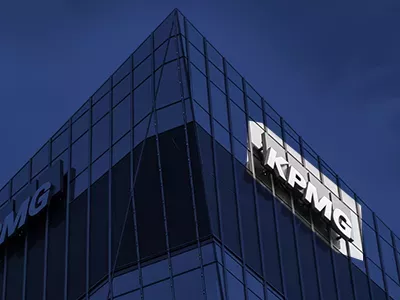

Board has allowed our business units to increase the efficiency of their planning processes significantly.
Ralph Schatten
Head of Controlling
FILMED IN 2018
00:00:19KPMG is an auditing and consulting firm. In Germany we've been supporting our customers for more than 125 years in more than 20 branches. Our customers include large DAX-listed companies, as well as many medium sized companies. Thematically, our services are organised in 5 business domains. In order to give our clients the best possible service, we've grouped our services into 5 different segments. And the good thing was that with Board we could interlink all our planning processes. Our goal in finance is to be a business partner and to support the business. We therefore created a project called Finance 2020 in order to design our digitalisation strategy. Board, as a planning system, is an important component of this strategy.
00:01:07What were your expectations towards the new system? To find a future-proof planning system we started by identifying the fundamental expectations we would have of a new planning environment. After many discussions we identified a goal with 5 key points to create a forward-thinking planning system for KPMG.
00:01:29What was the situation before Board was implemented? Before implementing Board, our situation was very different. We used different technologies - Excel and PowerPoint in combination with VBA macros. It made planning or consolidation very complicated with many interface tests and reconciliation audits, which made planning technically difficult. Organisationally, our life before Board was also very different, with many complicated coordination processes between the individual units. Generally, planning here at KPMG was viewed as permanent and very complicated.
00:02:10How did you go about solving your problems? Our key problems regarding processes and technology were solved in the following way. As regards processes, we have two key building blogs which we developed. Firstly we implemented One-Touch Planning, to significantly reduce the planning effort for the individual participants. This involves integrating all the steps from Market Development Strategy to Strategic Planning, as well as Detail Cost Planning and reducing them to their key components.
A further component was to develop an Early Warning System. With the Early Warning System, we wanted to replace our existing forecasting process. Firstly, to significantly reduce the planning effort, but also to increase the control relevance at management level. Our second pillar - Technology - contained a goal to create a Single Point of Content for all finance-related planning processes. This means that we unified all planning applications into an overarching, modern technological framework. Secondly we addressed Finance Ownership, meaning that all Design and Development work can be done exclusively by the relevant department, thereby increasing the know-how within the department, as well as allowing much faster and flexible reaction to future requirements and changes to the processes or the application itself.
00:03:29Why did you choose Board? We finally decided on the partnership with Board and the Board software, after a successful two-day Proof-of-Concept workshop with the Board team. They managed to map our process, design, and planning requirements in a unified model. In addition, the financial risk related to the moderate project cost was easy to calculate and justify. Furthermore, expert consulting teams within KPMG Germany provided support and advice to us on all questions related to the design and implementation of the Board software.
We are primarily using the functions of Performance Management which includes all planning functionalities for our Finance Planning application. Additionally, we are also using the Business Intelligence functionalities for the reporting of individual planning results.
00:04:24Has the Board application made a difference for you? Board has made the following differences for us: We can implement the system much faster. For example, the Early Warning System - from design and development to implementation with our users - took only two months. Furthermore, Board allows us to report flexibly and interactively. From sales, to consulting and support, we generally feel very well looked after by Board. As regards the planning application, even though I'm not exactly a database expert myself, I find the planning application very simple and intuitive to use.
00:05:07What are the business benefits related to the implementation of Board? The deployment of Board software has also allowed our business units to increase the efficiency of their planning processes significantly. For Sales Planning, the multidimensional planning and integration of products, markets, and production units has been substantially simplified and accelerated. The highlight was the support of a two-day planning campus with a real-time planning application. A further example is the Board-developed Market Place for internal activity allocation, which has become significantly simpler and faster.
00:05:46What is your vision for the future? What is important for a planning system for the future? Clearly, a view into the future - Predictive Planning. We need a planning system which is of course flexible and intuitive to use, and integrates all planning processes. However, we also need an interactive planning system which allows interaction with our existing data, as well as the use of external data to allow us prognoses for future-oriented control. For that we need a future-oriented planning system, and for that we need Board.